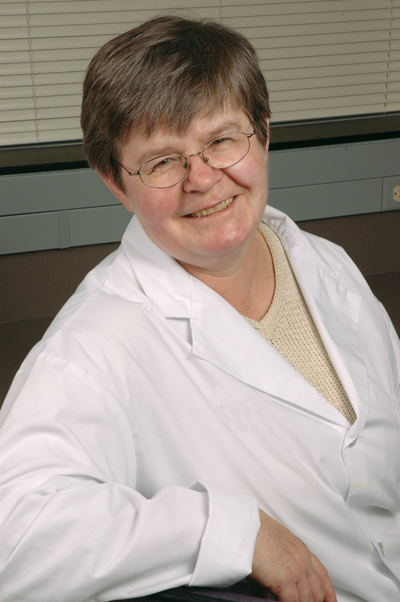
Dr. Brenda Allan
By Treena Hein
Features Profiles ResearchersThis VIDO researcher finds the poultry industry progressive and exciting
Interactive,” “exciting” and “collaborative” are the words Dr. Brenda Allan chooses to describe what it’s like to work at the University of Saskatchewan’s Vaccine and Infectious Disease Organization (VIDO).
Interactive,” “exciting” and “collaborative” are the words Dr. Brenda Allan chooses to describe what it’s like to work at the University of Saskatchewan’s Vaccine and Infectious Disease Organization (VIDO).
 |
|
| Dr. Brenda Allan believes that her biggest accomplishment has been understanding the bacteria that causes cellulites. Advertisement
|
Dr. Allan works in a very dynamic atmosphere – amongst scientists, students and support staff from more than 20 countries, using cutting-edge research and disease containment equipment. “We come together as a multidisciplinary group with an abundance of expertise,” she says. “People from many parts of the world bring different approaches to the research problems and different skill sets. On a social level, it’s also very stimulating to hear insights into different cultures.”
Allan’s passion for untangling the mysteries of poultry disease began forming during her childhood and youth on a mixed farm in southwestern Ontario. “Although I started off in nursing school,” she says, “my growing interest in microbiology drew me to the University of Waterloo for my undergraduate degree, and then on to the University of Guelph and Queen’s University for graduate work.”
Allan was the first member of her immediate family to attend university and is so far the only microbiologist. Her 20 year-old daughter Claire is studying kinesiology at the University of Saskatchewan. “My interests include making pottery, which I have done for many years,” she says. “I am an avid gardener and am especially interested in growing hostas, daylilies and Asiatic lilies. More recently, I have begun to develop skills in wood working!”
In 1989, Allan moved to Saskatoon to start her career at VIDO as a post-doctoral research fellow. “I became a Professional Research Associate in 1992, and in 1995 became a research Scientist,” she says, “I began serving as an Adjunct Professor at the Western College of Veterinary Medicine.”
Allan’s poultry disease research at VIDO is focused on three main areas: diseases caused by E. coli, transmission of Campylobacter jejuni and bird immune system stimulation. She collaborates with researchers at VIDO as well as the National Research Council, Agriculture and Agri-Food Canada, Alberta Agriculture, and universities within Canada, the U.S. and Ireland.
“Outside of direct research,” Allan says, “I also contribute to the training and mentoring of many students and scientists.” She supervised seven Post Doctoral Fellows, and served as a committee member for five graduate students. She’s contributed to 29 research publications, and makes regular presentations at national and international research meetings, such as the Canadian Western Meeting of Avian Clinicians and Pathologists and the Campylobacter, Helicobacter and Related Organism Meeting.
“I believe my work on understanding the bacteria causing cellulitis has been my biggest accomplishment,” observes Allan. “We showed that the group of E. coli that causes cellulitis did not differ from the E. coli that causes other problems – two examples being septicaemia and yolk sac infections. It’s important to remember, however, that industry practices can influence the susceptibility of birds to these types of infection.” She adds “These interactions are very significant, complex and not completely understood.” Allan says her ultimate career focus is to continue to do research that improves this understanding as it will help provide important direction to the poultry industry.
Allan finds the industry is both progressive and open-minded. “The enthusiasm is inspiring,” she says, “yet it’s also challenging. Even though we’d like to be able to deliver answers quickly and allow the industry to move forward all the faster, that’s not always possible. Important research questions often take many years to answer.”
Allan points out that in addition to being effective, poultry vaccines must be very inexpensive to produce – this provides us with a high challenge. “With the low cost of an individual bird,” she notes, “individual doses of vaccine must be worth less than a cent to keep production costs in line. In addition, with the volume of birds in the industry, consideration must also be given to finding easy ways to administer vaccines to large numbers of birds at one time.”
“The poultry industry and the people who work in it are dynamic and willing to respond to change, and I am happy to be a part of it,” she says. “They’re eager to develop new methods of disease control and production that will benefit themselves and consumers. In an environment where the use of antibiotics is under close scrutiny and restriction, they are rising to the challenge by developing better vaccines, and are looking for ways to reduce and possibly even eliminate the need for antibiotics.
|
Print this page